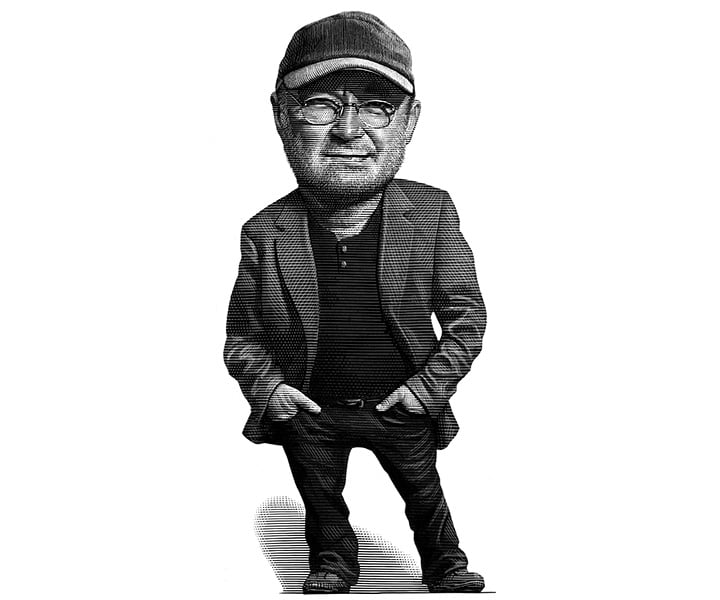Following his 2015 announcement that he is “no longer retired,” Phil Collins is preparing to hit the road again in 2017, starting with a series of gigs in London, Köln and Paris. “We’re working out a way to make a show special,” he told Rolling Stone recently.
As part of our Words of Wisdom interview series — and to coincide with the release of his new memoir, Not Dead Yet — we talk to the hitmaking singer-songwriter about sobriety, his return to drumming, his rocky romantic history and more.
Who are your heroes?
I’m fascinated with the Alamo, so I go back to Davy Crockett. There was a lot of bravery on both sides of the walls. Crockett was an example of someone who could have left the fort, but he did the right thing and stayed, and he was killed for it. Also, and I know this sounds random, but I admire Jack Nicholson. He’s so honest as an actor, down to his hair. It’s always out of place.
What book has left the most lasting impression on you?
Romeo and Juliet touched me very much. It’s a bit like the Alamo in its two factions. When the Franco Zeffirelli movie came out, I saw it many times. I was drawn to the romance – total romance. I do believe that childhood loves stick with you.
What’s the best part of success, and the worst part?
The best part is other people saying that they like what you do. The worst part is that it drags you onto the conveyor belt of working all the time, to maximise the success.
I just walked out of CBS and there were people outside that wanted me to sign something. In the old days, it would be fans. Now it’s people selling something on eBay. I wish there was a chip in someone’s neck saying “real fan”, because it’s not my style to diss people that have been waiting in the cold.
What music still moves you the most?
Leonard Bernstein’s West Side Story. I listen to that on my computer. Songs like “Maria”, “Somewhere” and “America” were so far ahead of their time.
In your memoir, you write about the guilt you felt from not being around much when your older kids were younger. How do you get over that?
You don’t. When I take my younger kids to football practice or give them advice, I’m reminded I didn’t do that with my older kids.
Love Music?
Get your daily dose of everything happening in Australian/New Zealand music and globally.
You recently got sober. What did you learn from the experience?
I didn’t know I was close to dying. If I had carried on drinking, my organs would have started shutting down. I also didn’t know the effect it was having on my kids. I was falling down because I was mixing alcohol with [pain] medication. One time I was watching TV and I got up to give my sons a hug. I fell down and my teeth made two marks in the tiles. There was lots of blood. I remember Matthew saying to their nanny, “Daddy’s fallen over!” Putting an eight-year-old through that, it gives me chills. By the time I stopped, my family disintegrated. Within six months, they’d moved away.
Did you emerge a stronger person?
Wiser, yeah. I got a sense of mortality, and then I didn’t drink for three years. Then, when we had our first Christmas in our new home, I had a couple of glasses of wine, but now it doesn’t go anywhere. An alcoholic is someone that wants to see the bottom of the bottle. I don’t consider myself an alcoholic. I made some mistakes, for sure.
“By the time I stopped drinking, my family disintegrated.”
After injuring your back, you were unable to play drums anymore. How did you come to terms with that?
It happened gradually on the Genesis reunion tour in 2007. Then I played with Clapton at Albert Hall for one song, and I had that feeling of “This isn’t happening”. That kind of scared me. The one thing I could rely on in life was that I could sit down at the drums and it would sound good, and suddenly I couldn’t pull it together. Now, I’ve got a drum kit in my garage and I’ve got into a routine of practicing. I’m trying to get my hands to feel natural again when I hold a pair of sticks. I’ve got some comeback shows booked for [2017], and we’ll see what happens.
Any chance you’ll do more Genesis shows in the future?
Writing the book reminded me how close we were. Tony [Banks], Mike [Rutherford] and I went out on my birthday in London. We’re still great pals. Anything can happen, really. I just don’t want to suddenly take the brakes off and start flying off and doing things. I want to do things carefully and think about the consequences.
When you divorced your wife Orianne eight years ago, you had to give her £25 million, one of the costliest divorces in history. But you actually got back together in 2015. Did that teach you something about forgiveness?
Usually when there’s divorce, you fall into “I don’t ever want to see you again”, that kind of thing. Orianne and I stayed in touch, very closely. I called the boys pretty much every day. It can be very difficult to forgive. But in our situation, we both felt we made a mistake. Our kids are obviously over the moon.
You’ve been divorced three times. Have you ever thought about a prenup?
I think they’re unethical. They say, “Oh, darling, I love you forever, but just in case…” It cost me a lot of money, but that’s lawyers for you. Anyway, I don’t envision getting married again.
But if you did?
I may. I’m just not considering that yet.
—
Illustration by Mark Summers.



































